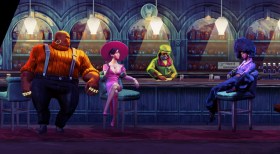Inspiration can come from the most unlikely places. For Naoki Yoshida, beloved director and producer of MMORPG Final Fantasy XIV, it came – of all places – from the original Mario. Bros, released for the
During an ACMI talk about his career, the games industry, and Final Fantasy XIV, Yoshida discussed his “origin story” as being one of exploration and experimentation. He first fell in love with games from a young age, playing Mario Bros. with a friend. But it was in how they played the game together that he began to realise his passion for game creation.
As Yoshida explained, the release of consoles like the Famicom was mind-boggling for younger kids in the 1980s. There was a novelty and “surprise” in seeing characters move across screens, as guided by your hand. Games of this era were basic, Yoshida said, but there was incredible scope to reimagine and reinvent gameplay with some imagination.
Yoshida described a pivotal moment that shaped his approach to game design: while Mario Bros. is designed to be a friendly action game, his friend would often play tricks on him in two-player mode by luring him towards one side of the screen, only to pop up and attack him. This began a competitive back-and-forth that changed the nature of the game itself.
This was an aspect that sparked Yoshida’s imagination – he and his friend were able to “reinterpret” the game and create a new form of play using Mario Bros. as a go-between. While the game wasn’t designed to be a fighter, experimenting with its bounds created a new form of play.
Read: Viral baby hippo Moo Deng has shaken up Final Fantasy XIV’s economy
According to Yoshida, these first experiences with gaming inspired a strong desire to pursue a career in the games industry. He was determined to be one of the people that made games. He wanted to wield his passion to create new experiences for play and connection.
While on this path, Yoshida also discovered the second game that would shape his career – Tactics Ogre: Let Us Cling Together. This tactical strategy game released just as Yoshida was about to enter the games workforce, and it had an incredible impact on him. Yoshida described being amazed at the game and its parameters. He called it a “great example of great game design” and felt it inspired him, while also “defeating” him with its high bar for quality.
Tactics Ogre was a game that opened Yoshida’s eyes to the sheer possibilities of game development, and it was part of the reason why he was inspired to join Square Enix. For reference, many of the key developers on Tactics Ogre joined Square soon after work on the game was complete.
Naoki Yoshida’s advice for emerging game developers
Within Yoshida’s talk, he described both Mario Bros. and Tactics Ogre as transformational games for him, with these inspiring his career in different ways. They both figured into his closing advice for developers seeking to create their own pathways into the games industry, as he believes it all starts with simply “playing lots and lots of games.”
Yoshida encouraged those looking to get into game development to play games of all kinds – and not only those that inspire creativity and connection, but also those that inspire feelings of boredom or dislike. As a game developer, it’s important to understand good game design, and bad game design, according to Yoshida. You should think with an analytic mind, figuring out why you don’t like a particular game, or what you could do to improve it.
After a funny aside about why studies aren’t as important as parents think they are, Yoshida concluded his talk with one important, enduring piece of advice: “Don’t be worried about failures.”
As Yoshida says, we all make mistakes and fail sometimes, and that’s a natural part of life. He’s made mistakes, and he’s “still here.” He’s still creating, and he’s still pushing forward – contributing to the future of Final Fantasy, reshaping Final Fantasy XIV, and also realising his childhood dreams.
“Continue to challenge yourself,” Yoshida said. “Don’t be afraid of mistakes.”





